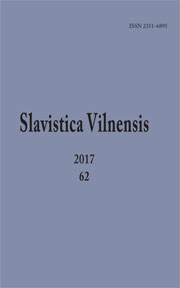Семантыка волі ў наіўнай карціне свету: супастаўляльны аспект (на матэрыяле беларускай і англійскай моў)
Semantics of Will in the Naïve Worldview: Comparative aspect (the case of Belarusian and English)
Author(s): Volha HapeyevaSubject(s): Syntax, Lexis, Semantics, Comparative Linguistics, Eastern Slavic Languages, Philology
Published by: Vilniaus Universiteto Leidykla
Keywords: will; naive worldview; semantic zones; lexical and syntactic combinability; metaphorization; categorization; linguistic comparative studies;
Summary/Abstract: This article considers the phenomenon of will in the naive worldview of Belarusian and English native speakers. On the basis of collected factual material, the author distinguishes syntactic models, studies lexical collocations and the semantic environment of will/воля and explores ways of metaphorization and categorization in both languages. By comparing the singled-out features, the author identifies allomorphic and isomorphic traits in the conceptualization of will in Belarusian and English. Among other common characteristics are the location of will in the zone between ration and emotions, its belonging to the sphere of morality and ethics, the image of will as some physical power or system that is possible to train, etc.
Journal: Slavistica Vilnensis
- Issue Year: 62/2017
- Issue No: -
- Page Range: 241-254
- Page Count: 14
- Language: Russian

